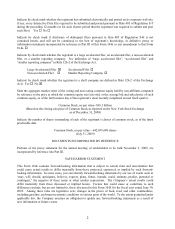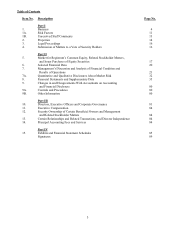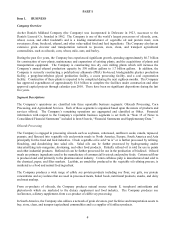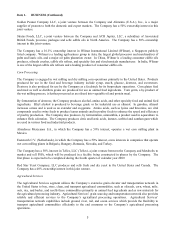Archer Daniels Midland 2009 Annual Report Download - page 18
Download and view the complete annual report
Please find page 18 of the 2009 Archer Daniels Midland annual report below. You can navigate through the pages in the report by either clicking on the pages listed below, or by using the keyword search tool below to find specific information within the annual report.12
Item 1A.
RISK FACTORS (Continued)
The Company’s operating results could be affected by changes in trade, monetary and fiscal policies, laws and
regulations, and other activities of governments, agencies, and similar organizations. These conditions include but
are not limited to changes in a country’s or region’s economic or political conditions, trade regulations affecting
production, pricing and marketing of products, local labor conditions and regulations, reduced protection of
intellectual property rights, changes in the regulatory or legal environment, restrictions on currency exchange
activities, currency exchange fluctuations, burdensome taxes and tariffs, enforceability of legal agreements and
judgments, and other trade barriers. International risks and uncertainties, including changing social and economic
conditions as well as terrorism, political hostilities, and war, could limit the Company’s ability to transact business
in these markets and could adversely affect the Company’s revenues and operating results.
Government policies and regulations, in general, and specifically affecting the agricultural sector and related
industries, could adversely affect the Company’s operating results.
Agricultural production and trade flows are subject to government policies and regulations. Governmental policies
affecting the agricultural industry, such as taxes, tariffs, duties, subsidies, incentives, and import and export
restrictions on agricultural commodities and commodity products, can influence the planting of certain crops, the
location and size of crop production, whether unprocessed or processed commodity products are traded, the volume
and types of imports and exports, the availability and competitiveness of feedstocks as raw materials, and industry
profitability. In addition, international trade disputes can adversely affect agricultural commodity trade flows by
limiting or disrupting trade between countries or regions. Future government policies may adversely affect the
supply of, demand for, and prices of the Company’s products, restrict the Company’s ability to do business in its
existing and target markets, and could negatively impact revenues and operating results.
The Company is subject to industry-specific risks which could adversely affect the Company’s operating results.
The Company is subject to risks which include, but are not limited to, product quality or contamination, shifting
consumer preferences, federal, state, and local food processing regulations, and customer product liability claims.
The liability which could result from these risks may not always be covered by, or could exceed liability insurance
related to product liability and food safety matters maintained by the Company. The occurrence of any of the
matters described above could adversely affect the Company’s revenues and operating results.
Certain of the Company’s merchandised commodities and finished products are used as ingredients in livestock
and poultry feed. The Company is subject to risks associated with the outbreak of disease in livestock and
poultry, including, but not limited to, mad-cow disease and avian influenza. The outbreak of disease could
adversely affect demand for the Company’s products used as ingredients in livestock and poultry feed. A
decrease in demand for these products could adversely affect the Company’s revenues and operating results.
The Company is subject to numerous laws and regulations globally which could adversely affect the Company’s
operating results.
The Company is required to comply with the numerous and broad reaching laws and regulations administered by
United States federal, state, local, and foreign governmental agencies relating to, but not limited to, the sourcing,
transporting, storing, and processing of agricultural raw materials as well as the transporting, storing and
distributing of related agricultural products, including commercial activities conducted by Company employees and
third parties globally. Any failure to comply with applicable laws and regulations could subject the Company to
administrative penalties and injunctive relief, and civil remedies including fines, injunctions, and recalls of its
products.
The production of the Company’s products requires the use of materials which can create emissions of certain
regulated substances. Although the Company has programs in place throughout the organization globally to guard
against non-compliance, failure to comply with these regulations can have serious consequences, including civil
and administrative penalties as well as a negative impact on the Company’s reputation.
























